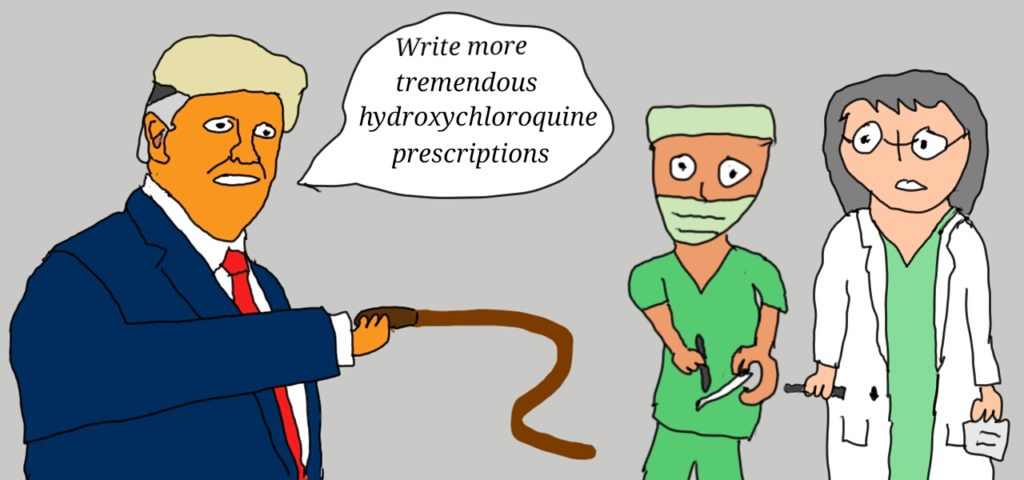by Craig Klugman, Ph.D.
On March 31, the U.S. Department of Justice put in an order for $60,000 worth of hydroxychloroquine, a drug that Trump has been pushing as a treatment for COVID-19 (to clarify, it is unproven and has never worked on any other coronavirus). On March 26, the U.S. Department of Veteran’s Affairs purchased $40,000 of the same drug. Sandoz and Bayer donated 30 million doses to the National Stockpile to be given to COVID-19 patients who were not enrolled in clinical trials of the drug.
Trump’s efforts to be a spokesperson for this drug have baffled many and seem to be based on an early study done in France. However, that study was poorly designed and did not prove anything. Several weeks ago I wrote about the problems in the studies that were the basis for the President’s claim.

As recently as this week, Trump said, “What do you have to lose?” As it turns out, quite a bit. This drug has some serious side effects like cardiac arrest through disrupting the electrical functioning of the heart. Other known side effects are to renal function and vision loss. This is not a benign pill. The CDC, which had supported its use for COVID-19 on their website has now deleted that guidance.
Normally, in these situations where a product is being pushed despite lack of any evidence that it works, I would suggest we follow the money trail. What is the Trump family gaining from increasing sales? But in this case, the family trusts own so little stock in the manufacturers that they aren’t gaining much of anything. There are some suggestions that some Trump financial backers and industry insiders might have lobbied for the sales pitch but the evidence is pretty thin. Someday historians will give us the answer.
My interest is from a different angle: Hydroxychloroquine is a scheduled drug that requires a prescription to get. No patient gets access to the drug without a health care provider first prescribing it; even if they are applying under a compassionate use provision, they need a gatekeeper. Given the lack of empirical evidence, why is any health care provider prescribing this drug to COVID patients? Nevermind the President’s daily game show as pitchman for this drug and put aside Fox News’ love affair with magical thinking when it comes to this drug, why are doctors prescribing it?
A health care provider is a highly educated, highly skilled, thinking individual. Prescribing a drug that not only has not been proven to work, but has a serious set of side effects violates the principle of nonmaleficence. The action violates the basis of evidence-based medicine. Perhaps some fear consequences if they do not prescribe and it later turns out the drug is effective (note: this is unlikely to happen)? Might they be concerned about future liability for not prescribing (though there is not a right, at least in the U.S., to any drug)? Or maybe this is similar to the patient who shows up with a rhinovirus (i.e. common cold) but demands an antibiotic (which is ineffective against a virus). In that scenario, doctors give the ineffective (and dangerous since it’s a set up for evolving resistance) 60% of the time. Studies have shown a correlation between prescribing and a lack of time with patients, being a female patient, and having private insurance. A patient (with money or insurance coverage) demanding a drug can be a powerful influence when they view themselves as consumers who can give bad reviews, bad patient satisfaction scores, and think they can take their “business” elsewhere. A worthwhile study would be to examine the demographics of who prescribed hydroxychloroquine for COVID and to whom.
The other possibility, and again a study would need to be done, is whether the political leaning of the HCP has any effect on whether they prescribed. Are Republican or Trump-supporting health care providers more likely to prescribe a drug touted by “Dr.” Trump? A 2018 study found no correlation between political affiliation and “intensity of end of life care”. However, another report found that specialties tend to be dominated with people who share a particular political affiliation: Surgeons and anesthesiologist are more likely to be Republican, psychiatrists and infectious disease specialists are more likely to be Democrats. Emergency and family medicine docs are even split. Even if this were suggestion of political affiliation and prescribing hydroxychloroquine were found to be a fact (again, not yet studied), the reality is that good medicine is based on scientific evidence and clinical experience, not political loyalty.
As a society we rely on health care providers to be educated, reasonable, and to protect us from harm (or at least to not cause harm). When it comes to the COVID frontlines of the ED and clinic, they are superheroes. But like all who are hoping for a miracle cure, they can be susceptible to magical thinking and unrealistic hope. What we can’t’ afford is for them to substitute fantasy and being swayed by charisma for clinical judgement and reliance on science.